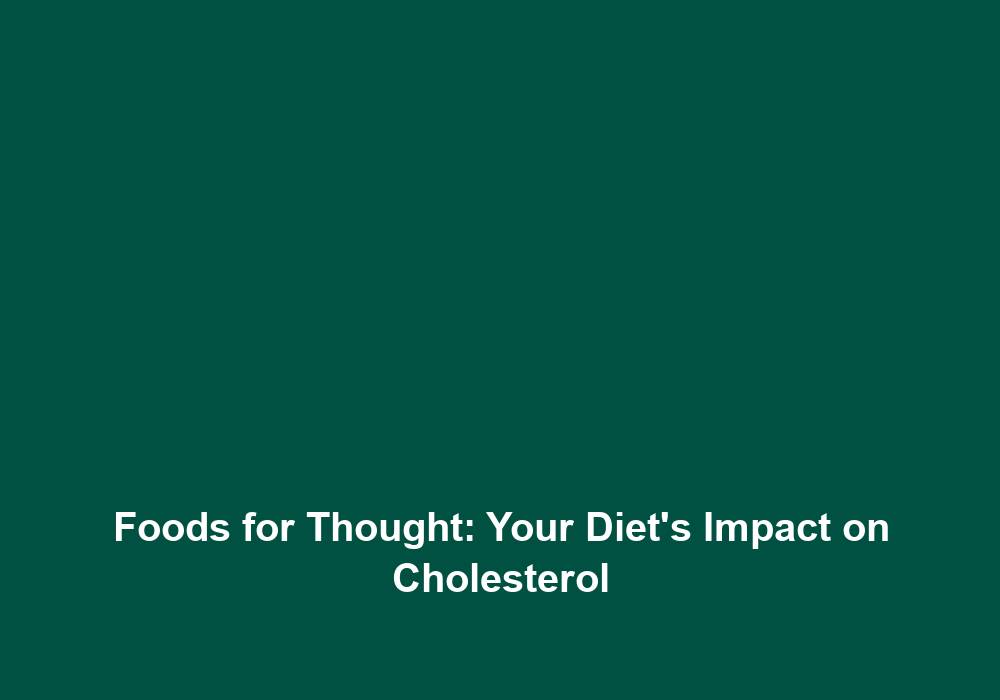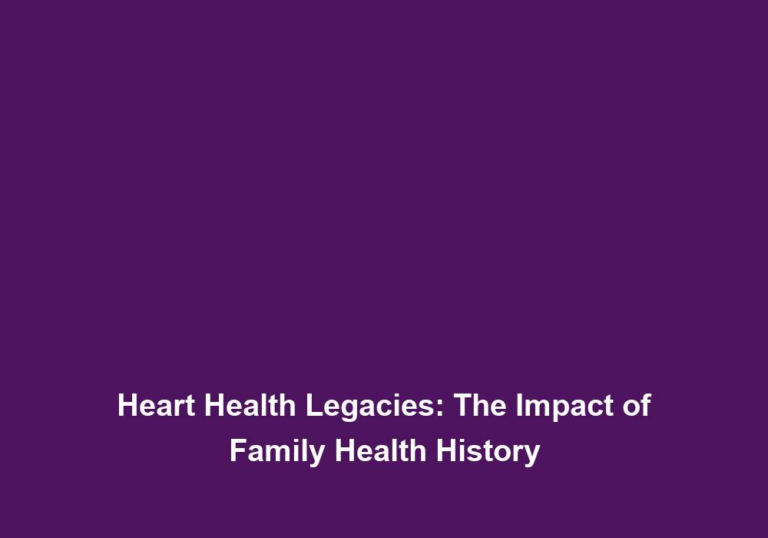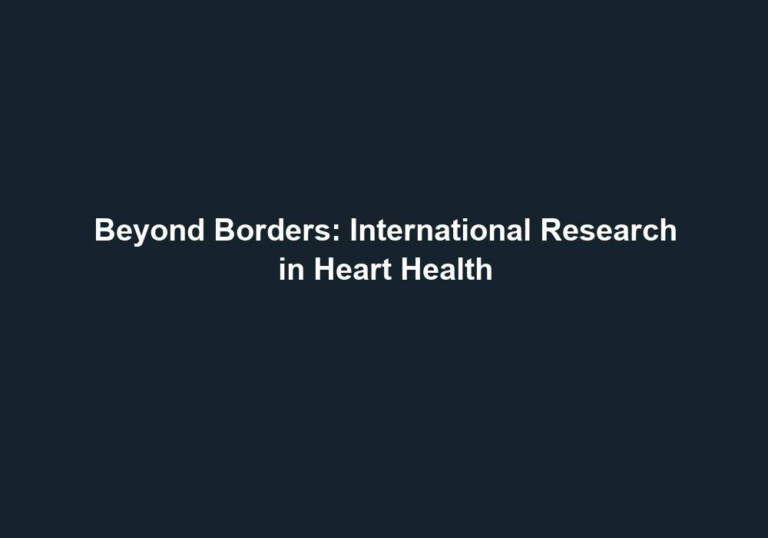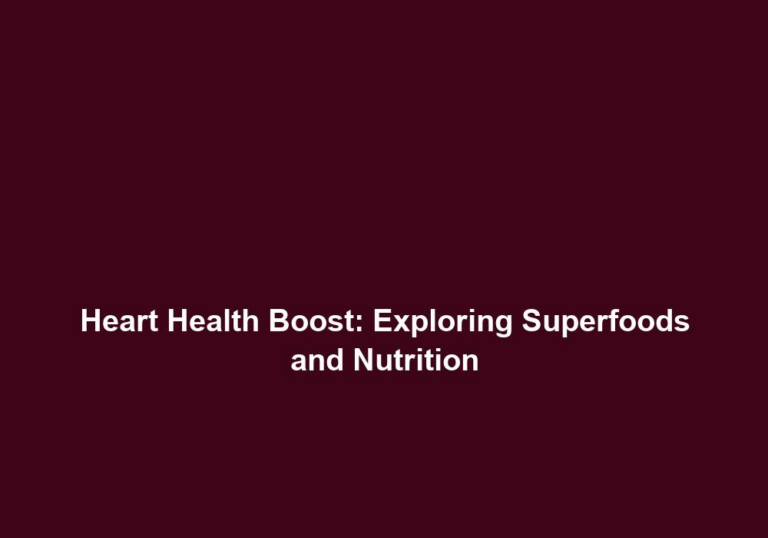Foods for Thought: Your Diet’s Impact on Cholesterol
Maintaining a healthy diet is essential for overall well-being, and one aspect that deserves our attention is the impact of our diet on cholesterol levels. High cholesterol is a common health concern that can lead to various cardiovascular problems if not managed properly. Fortunately, making conscious choices about the foods we consume can positively influence our cholesterol levels and help promote a healthy heart.
Understanding Cholesterol
Before delving into the impact of diet on cholesterol, it’s imperative to understand what cholesterol is and its role in the body. Cholesterol is a waxy, fat-like substance that our bodies produce naturally. It is essential for building and maintaining cell membranes, producing hormones, and aiding in digestion. However, there are two types of cholesterol: low-density lipoprotein (LDL) cholesterol, often referred to as bad cholesterol, and high-density lipoprotein (HDL) cholesterol, often known as good cholesterol.
LDL cholesterol can accumulate in the arteries, leading to plaque buildup, narrowing them, and ultimately increasing the risk of heart disease. HDL cholesterol, on the other hand, helps remove LDL cholesterol from the bloodstream, reducing the risk of heart problems. Therefore, it’s important to focus on reducing LDL cholesterol levels and increasing HDL cholesterol levels through diet and lifestyle choices.
Dietary Tips for Managing Cholesterol
-
Include heart-healthy fats: Incorporating sources of healthy fats into your diet can have a positive impact on cholesterol levels. Opt for foods rich in monounsaturated fats such as olive oil, avocados, and nuts. These fats can help lower LDL cholesterol while maintaining or increasing HDL cholesterol levels.
- Olive oil: Olive oil is an excellent source of monounsaturated fats, which can help reduce LDL cholesterol levels. It is also rich in antioxidants that promote heart health.
- Avocados: Avocados are another great source of monounsaturated fats. They also contain fiber, which can help lower cholesterol levels.
- Nuts: Almonds, walnuts, and pistachios are examples of nuts that are high in monounsaturated fats. They can be a healthy snack choice that supports heart health.
-
Choose lean protein sources: Consuming lean sources of protein is crucial for a heart-healthy diet. Opt for lean meat like skinless poultry, fish rich in omega-3 fatty acids (salmon, mackerel, and sardines), and plant-based protein sources like beans, lentils, and tofu.
- Skinless poultry: Chicken and turkey without the skin are lean protein sources that are low in saturated fats.
- Fatty fish: Fatty fish such as salmon, mackerel, and sardines are rich in omega-3 fatty acids, which can help lower LDL cholesterol levels and reduce the risk of heart disease.
- Beans and lentils: These plant-based protein sources are not only low in fat but also high in fiber, which can help manage cholesterol levels.
- Tofu: Tofu is a versatile plant-based protein that is low in saturated fat and can be incorporated into various dishes.
-
Increase dietary fiber: Foods high in soluble fiber can help reduce LDL cholesterol levels. Incorporate whole grains like oats, barley, and quinoa into your meals. Fruits, vegetables, legumes, and nuts are also excellent sources of dietary fiber.
- Whole grains: Whole grains are rich in fiber and can help lower cholesterol levels. Oats, barley, and quinoa are examples of whole grains that can be included in your diet.
- Fruits and vegetables: Apples, berries, and citrus fruits are not only high in fiber but also contain antioxidants that promote heart health. Vegetables like broccoli, cauliflower, and leafy greens are also excellent sources of fiber.
- Legumes: Beans, lentils, and chickpeas are legumes that are not only high in fiber but also low in fat, making them heart-healthy choices.
- Nuts: In addition to being a source of healthy fats, nuts such as almonds and walnuts are also high in fiber.
-
Add cholesterol-lowering fruits and vegetables: Certain fruits and vegetables have cholesterol-lowering properties. Include apples, grapes, citrus fruits, berries, cruciferous vegetables (broccoli, cauliflower), and leafy greens (spinach, kale) in your diet regularly.
- Apples: Apples are rich in soluble fiber called pectin, which can help lower LDL cholesterol levels.
- Grapes: Grapes contain a compound called resveratrol, which may help increase HDL cholesterol levels.
- Citrus fruits: Oranges, lemons, and grapefruits are citrus fruits that are high in soluble fiber and antioxidants, which can help manage cholesterol levels.
- Berries: Berries such as strawberries, blueberries, and raspberries are packed with antioxidants and fiber, making them beneficial for heart health.
- Cruciferous vegetables: Broccoli and cauliflower are cruciferous vegetables that contain compounds that may help lower cholesterol levels.
- Leafy greens: Spinach and kale are leafy greens that are rich in antioxidants and fiber, supporting heart health.
-
Limit saturated and trans fats: Foods high in saturated and trans fats can raise LDL cholesterol levels. Minimize your intake of red meat, full-fat dairy products, butter, and foods containing hydrogenated oils or partially hydrogenated oils.
- Red meat: Limit your consumption of red meat, as it is high in saturated fat. Choose lean cuts of meat or opt for alternative protein sources.
- Full-fat dairy products: Choose low-fat or fat-free versions of milk, yogurt, and cheese to reduce saturated fat intake.
- Butter: Replace butter with healthier alternatives such as olive oil or avocado spread.
- Hydrogenated oils: Avoid foods that contain hydrogenated oils or partially hydrogenated oils, as they are sources of trans fats that can raise LDL cholesterol levels.
-
Include omega-3 fatty acids: Omega-3 fatty acids can help lower LDL cholesterol and reduce inflammation. Besides fatty fish, other sources include chia seeds, flaxseeds, walnuts, and soybeans.
- Fatty fish: Fatty fish such as salmon, mackerel, and sardines are rich in omega-3 fatty acids. Aim to include them in your diet at least twice a week.
- Chia seeds and flaxseeds: These seeds are plant-based sources of omega-3 fatty acids. Add them to smoothies, yogurt, or baked goods for a nutritional boost.
- Walnuts: Walnuts are not only a source of omega-3 fatty acids but also contain other heart-healthy nutrients like fiber and antioxidants.
- Soybeans: Incorporate soy products like tofu or edamame into your meals to increase your omega-3 fatty acid intake.
-
Moderate alcohol consumption: While moderate alcohol consumption may have some heart benefits, excessive intake can lead to various health issues. Limit alcohol consumption to moderate levels, such as one drink per day for women and two drinks per day for men.
- Moderate alcohol consumption: Moderate alcohol consumption has been associated with increased HDL cholesterol levels. However, it’s important to drink in moderation and not exceed the recommended limits. One drink per day for women and up to two drinks per day for men is considered moderate.
Lifestyle Recommendations for Healthy Cholesterol Levels
-
Maintain a healthy weight: Excess weight, especially around the waistline, can increase LDL cholesterol levels. Incorporate regular exercise and a balanced diet to maintain a healthy weight and promote heart health.
- Regular exercise: Engage in physical activity for at least 150 minutes of moderate-intensity aerobic activity or 75 minutes of vigorous activity per week. This can include activities like brisk walking, cycling, or swimming.
- Balanced diet: Focus on consuming a variety of nutrient-dense foods in appropriate portions to maintain a healthy weight. Incorporate fruits, vegetables, whole grains, lean proteins, and healthy fats into your meals.
-
Engage in regular physical activity: Regular exercise helps increase HDL cholesterol while reducing LDL cholesterol and improving overall cardiovascular health. Aim for at least 150 minutes of moderate-intensity aerobic activity or 75 minutes of vigorous activity per week.
- Moderate-intensity aerobic activity: Engage in activities like brisk walking, cycling, or dancing that increase your heart rate and breathing.
- Vigorous activity: Activities like running, swimming, or playing sports that significantly increase your heart rate and breathing can provide additional benefits for cholesterol management.
-
Quit smoking: Smoking damages blood vessels and lowers HDL cholesterol levels. Quitting smoking can lead to significant improvements in cholesterol levels and overall heart health.
- Seek support: If you need assistance quitting smoking, reach out to healthcare professionals or support groups that can provide guidance and resources.
- Nicotine replacement therapy: Consider using nicotine replacement therapy or other cessation aids to increase your chances of successfully quitting smoking.
-
Manage stress levels: Chronic stress can contribute to high cholesterol levels and increase the risk of heart disease. Implement stress-management techniques such as meditation, deep breathing exercises, yoga, or engaging in hobbies to promote overall well-being.
- Meditation and deep breathing exercises: Practice mindfulness meditation or deep breathing exercises to reduce stress levels and promote relaxation.
- Yoga: Engage in yoga sessions to combine physical activity with stress reduction techniques.
- Hobbies and leisure activities: Dedicate time to activities that you enjoy, such as reading, gardening, or spending time with loved ones, to help manage stress.
Conclusion
Incorporating heart-healthy foods and making lifestyle modifications can significantly impact cholesterol levels and promote a healthy heart. By choosing the right fats, including fiber-rich foods, and incorporating cholesterol-lowering fruits and vegetables, you can effectively manage your cholesterol levels. Furthermore, maintaining a healthy weight, engaging in regular physical activity, quitting smoking, and managing stress levels are essential for overall cardiovascular health. Remember, small changes in your diet and lifestyle can yield significant long-term benefits for your heart health.







